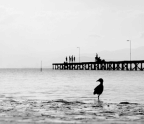Malali and Me
 Northern Afghanistan. Photo by the USGS on Unsplash.
Northern Afghanistan. Photo by the USGS on Unsplash.
This is the second of two pieces looking at resistance and Afghanistan. The first, an exclusive look inside the ongoing armed resistance to the Taliban, appeared in Guernica last week. This piece runs in collaboration with the latest issue of Adi Magazine, “Afghan Women: A Polyphony.”
The first time I’d seen Malali was in Tehran, three years earlier. Afterward she insisted I meet her in Kabul. But I wanted no part of going to Kabul. I told her that if she wanted to put me in front of the camera, she had to come to Iran. This was where I lived, not in Afghanistan. We continued to exchange emails. She kept harping about wanting to make a film about refugees and wanted me, a refugee, in her film. That was fine, I told her.
But first she had to explain to me what and who, exactly, a refugee is to her. I, for one, didn’t feel like one.
She had received this plum project from the Afghan government at the time. Flush with money from the Americans, the government was giving her wads of cash to make a documentary on second- and third-generation Afghan women refugees, especially those who were educated and maybe had realized a modicum of success or integration wherever they happened to live. It was, I suppose, one way of coaxing us back to the motherland, and through internet searching, Malali had eventually gotten around to me.
She was a second-generation emigrant herself, born to Afghan parents who had fled to Germany during the Soviet occupation years. She’d studied cinema in Berlin, and now, with the hard-to-resist dollars that the Afghan government was offering, she had decided to return to Afghanistan for “work.”
That first time she came into the bookstore-café that I manage in the heart of Tehran, she seemed to me a young European woman, freckles and all, with a very poor Persian Dari accent. The color of her skin and her hair was so light that it was truly difficult for me to imagine I wasn’t talking to a German. During her six days in my city, we sat for hours every day in my café and just talked, a mile a minute. Mostly the conversation had little to do with her project. Now and then we would correct each other’s vocabulary in order to show off our knowledge of Persian. We talked about the realities of the refugee life, about our worlds in Tehran and Berlin, really about anything — except the documentary that I dreaded. Mostly,
You’re reading a preview, subscribe to read more.
Start your free 30 days





